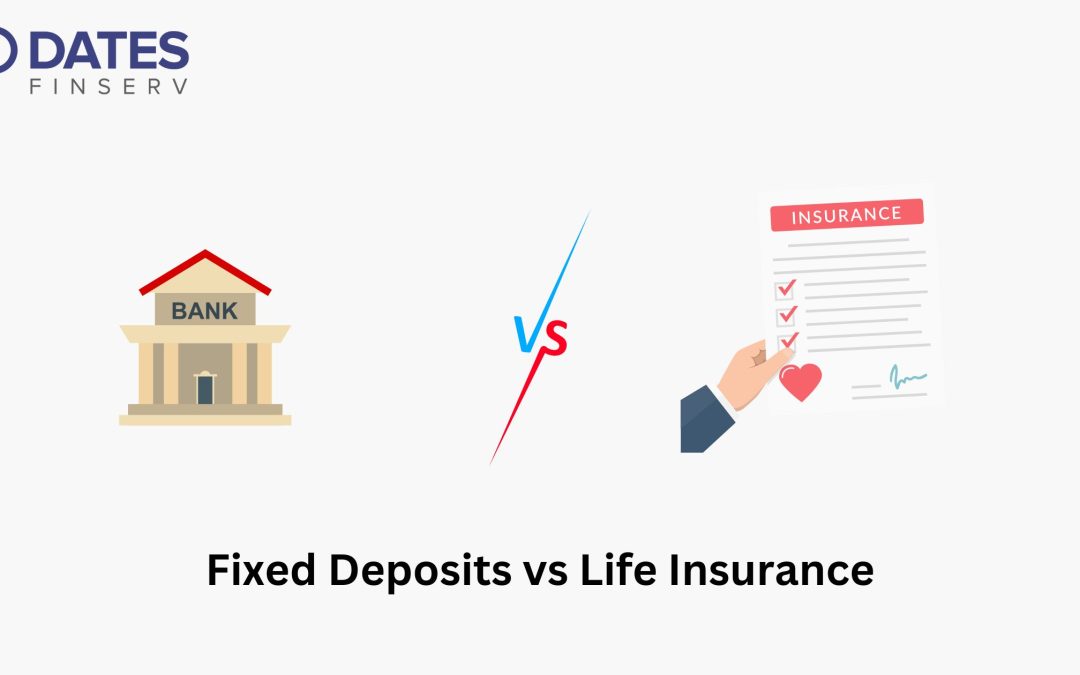Ever found yourself wondering where to park your hard-earned money? Should you go with a Fixed Deposit (FD), the age-old favorite for guaranteed returns? Or should you opt for Life Insurance, which offers financial security for your family? It’s a dilemma that many face, especially when trying to balance savings with future protection.
This guide will break down everything you need to know about FDs and Life Insurance, helping you make the right choice based on your needs and goals. Let’s get started.
What is a Fixed Deposit (FD)?
A Fixed Deposit (FD) is one of the most straightforward and trusted financial instruments out there. It’s simple: you deposit a lump sum of money in a bank or financial institution for a fixed period, and in return, you earn interest on it. The best part? The returns are predictable. Unlike market-linked investments, the interest rate on an FD doesn’t change, making it a favorite among risk-averse investors.
How Fixed Deposits Work
When you invest in an FD, you lock in a specific amount of money for a chosen tenure—this could be as short as 7 days or as long as 10 years. During this period, the bank pays you interest on your deposit. You can either let the interest accumulate or withdraw it at regular intervals. Once the tenure ends, you get your principal amount back along with the interest earned.
For instance, if you deposit ₹1,00,000 in an FD for five years at an annual interest rate of 6%, you’ll earn ₹30,000 in interest by the end of the tenure. That’s ₹1,30,000 in total—guaranteed.
Benefits of FDs
- Great for Short-Term Goals: Saving for a vacation or a big purchase? FDs are perfect for achieving those goals.
- Low Risk, High Safety: Your money is safe, and returns are fixed—no unpleasant surprises.
- Flexible Tenures: You can choose a duration that fits your goals, whether short-term or long-term.
- Liquidity: Need cash before the tenure ends? You can withdraw your FD early, though it may come with a small penalty.
What is Life Insurance?
Life Insurance is not just a financial product—it’s a safety net. It ensures that your family is financially protected in case of your untimely demise. Life Insurance offers peace of mind, knowing that even if something unexpected happens, your loved ones won’t struggle financially.
Types of Life Insurance Policies
Life Insurance isn’t one-size-fits-all. There are several types of policies to suit different needs:
- Term Insurance: Pure life cover for a specific period. If something happens to you during the term, your family gets the payout.
- Whole Life Insurance: Offers coverage for your entire life, along with a savings component.
- Endowment Plans: Combines insurance with savings; you get a lump sum amount on maturity.
- ULIPs (Unit Linked Insurance Plans): A mix of insurance and investment, with returns linked to the market.
Benefits of Life Insurance
- Family Security: Ensures your loved ones don’t face financial hardships after you’re gone.
- Tax Benefits: The premiums you pay are tax-deductible under Section 80C, and the maturity benefits are tax-free under Section 10(10D).
- Savings and Investment: Some policies double as investment tools, helping you grow your wealth while providing coverage.
- Customizable Plans: You can choose add-ons like critical illness cover or accidental death benefits to suit your needs.
Difference Between Fixed Deposit and Life Insurance
| Particulars | Fixed Deposit (FD) | Life Insurance |
|---|---|---|
| Purpose | Primarily savings and capital preservation | Financial security for the family, with investment options |
| Tenure | 7 days to 10 years | Life coverage for up to 100 years (age restrictions apply) |
| Minimum Investment | ₹1,000 (no maximum limit) | Premium varies depending on age, health, and policy value |
| Returns | Returns are fixed by the bank at time of opening an FD account | Varies by plan; ULIPs offer market-linked returns |
| Withdrawal | Early withdrawal possible with penalty | Early withdrawal possible with a penalty |
| Risk | Low risk, fixed returns | Depends on the plan; ULIPs are market-linked, term plans have low risk |
Which is Better: Fixed Deposit or Life Insurance?
The choice between a fixed deposit and life insurance depends on your financial goals:
Fixed Deposits
FDs are ideal for individuals looking for short-term investments with guaranteed returns. They suit investors who prefer low-risk and predictable income. FDs are also easier to liquidate, albeit with penalties for premature withdrawals. However, they offer lower returns compared to life insurance plans, and only tax-saving FDs provide tax benefits.
Life Insurance
Life insurance offers dual benefits: financial security and potential returns. While term plans focus solely on protection, other plans like ULIPs allow you to invest in the market. Life insurance is typically a long-term commitment, with tax advantages on both premiums and payouts. If your goal is to provide for your family in case of unfortunate events while also growing your wealth, life insurance may be more appropriate.
Conclusion
When deciding between FDs and life insurance, consider your financial goals, risk tolerance, and time horizon. Fixed deposits are more suitable for short-term, low-risk savings, while life insurance can help you secure your family’s future and provide potential growth for long-term goals. Always ensure your investments align with your financial objectives.
Frequently Asked Questions
1. Can I break my FD early?
Yes, you can break your FD before maturity, but penalties will apply.
2. Is life insurance a good investment?
It can be, especially if you choose a plan that aligns with your financial goals, such as a ULIP for investment purposes or a term plan for pure protection.
3. What are the tax benefits for FDs and life insurance?
Tax-saving FDs offer deductions under Section 80C. Life insurance premiums and payouts can also be exempt under Sections 80C and 10(10D).

